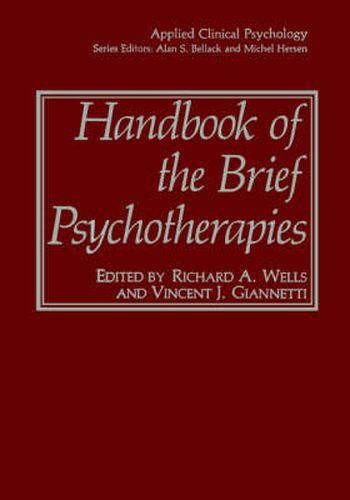Readings Newsletter
Become a Readings Member to make your shopping experience even easier.
Sign in or sign up for free!
You’re not far away from qualifying for FREE standard shipping within Australia
You’ve qualified for FREE standard shipping within Australia
The cart is loading…






This title is printed to order. This book may have been self-published. If so, we cannot guarantee the quality of the content. In the main most books will have gone through the editing process however some may not. We therefore suggest that you be aware of this before ordering this book. If in doubt check either the author or publisher’s details as we are unable to accept any returns unless they are faulty. Please contact us if you have any questions.
The last two decades have seen unprecedented increases in health care costs and, at the same time, encouraging progress in psychotherapy research. On the one hand, accountability, cost-effectiveness, and efficiency have now become commonplace terms for providers of mental health services whereas, on the other hand, an increasingly voluminous literature has emerged supporting the effectiveness of a number of types of psychotherapies. There now exists the possibility for the design and delivery of mental health services that-drawing upon this literature-more closely approximate empirically established data concerning the appropriateness and effectiveness of psychotherapy. The Handbook of the Brief Psychotherapies is intended to capture one major thrust of this movement: the development of a group of empirically grounded, time-limited therapies all sharing a common interest in the clinical utilization of a structured focus and an emphasis on time and action. For many years, professional self-interest, competing theoretical para digms, and the vagaries of practice, wisdom, and clinical myth have influenced the practice of psychotherapy. A critical questioning of the resulting, predomi nantly nondirective, open-ended, and global therapies has led to a growing emphasis on action-oriented, problem-focused, time-limited therapies. Yet, ironically, this interest in the brief psychotherapies has not so much involved a radical departure from traditional therapeutic modalities as it has emphasized a new pragmatism about how time, action, and structure operate in life as well as in therapy.
$9.00 standard shipping within Australia
FREE standard shipping within Australia for orders over $100.00
Express & International shipping calculated at checkout
This title is printed to order. This book may have been self-published. If so, we cannot guarantee the quality of the content. In the main most books will have gone through the editing process however some may not. We therefore suggest that you be aware of this before ordering this book. If in doubt check either the author or publisher’s details as we are unable to accept any returns unless they are faulty. Please contact us if you have any questions.
The last two decades have seen unprecedented increases in health care costs and, at the same time, encouraging progress in psychotherapy research. On the one hand, accountability, cost-effectiveness, and efficiency have now become commonplace terms for providers of mental health services whereas, on the other hand, an increasingly voluminous literature has emerged supporting the effectiveness of a number of types of psychotherapies. There now exists the possibility for the design and delivery of mental health services that-drawing upon this literature-more closely approximate empirically established data concerning the appropriateness and effectiveness of psychotherapy. The Handbook of the Brief Psychotherapies is intended to capture one major thrust of this movement: the development of a group of empirically grounded, time-limited therapies all sharing a common interest in the clinical utilization of a structured focus and an emphasis on time and action. For many years, professional self-interest, competing theoretical para digms, and the vagaries of practice, wisdom, and clinical myth have influenced the practice of psychotherapy. A critical questioning of the resulting, predomi nantly nondirective, open-ended, and global therapies has led to a growing emphasis on action-oriented, problem-focused, time-limited therapies. Yet, ironically, this interest in the brief psychotherapies has not so much involved a radical departure from traditional therapeutic modalities as it has emphasized a new pragmatism about how time, action, and structure operate in life as well as in therapy.